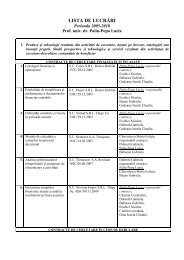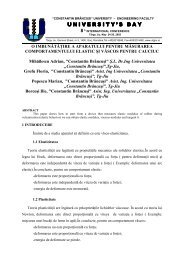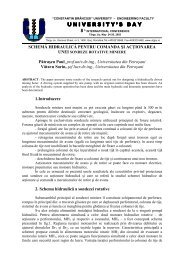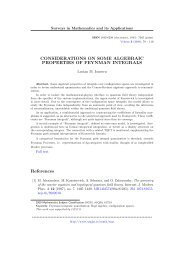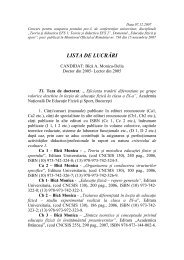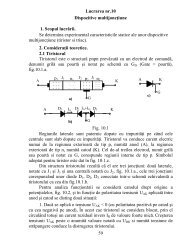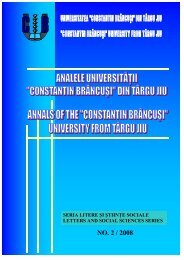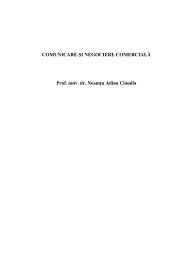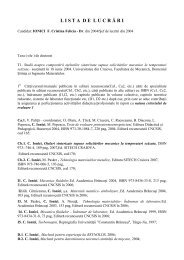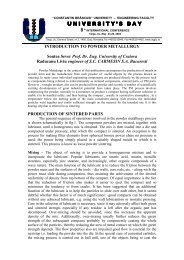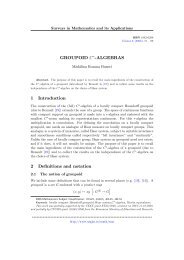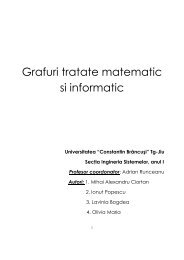the resistible rise of arturo ui, brecht's adaptation of richard iii
the resistible rise of arturo ui, brecht's adaptation of richard iii
the resistible rise of arturo ui, brecht's adaptation of richard iii
You also want an ePaper? Increase the reach of your titles
YUMPU automatically turns print PDFs into web optimized ePapers that Google loves.
Annals <strong>of</strong> <strong>the</strong> „Constantin Brâncuși” University <strong>of</strong> Târgu Jiu, Letters and Social Sciences Series<br />
Issue 2/2013<br />
There are multiple examples <strong>of</strong> Brecht‟s play productions in <strong>the</strong> modern <strong>the</strong>atre and<br />
cinema. The part <strong>of</strong> Arturo Ui has been played by actors such as Al Pacino, Leonard<br />
Rossiter, Antony Sher or Peter Falk. Lines from <strong>the</strong> play are quoted at <strong>the</strong> end <strong>of</strong> a drama<br />
war film from 1977, Cross <strong>of</strong> Iron, directed by Sam Peckinpah:<br />
“Do not rejoice in his defeat you men.<br />
For though <strong>the</strong> world has stood up and stopped <strong>the</strong> bastard, <strong>the</strong> bitch that bore him s<br />
in heat again.”[7]<br />
A production <strong>of</strong> <strong>the</strong> play by Jimmy Fay in 2008 is being analyzed in a <strong>the</strong>atre<br />
review appeared in The Guardian: “In this compelling production by Jimmy Fay, Arturo<br />
Ui and his henchmen command every second <strong>of</strong> our attention. Combining Hollywood<br />
glamour with thuggery <strong>the</strong>y strut across Conor Murphy‟s atmospheric set – warehouses<br />
with vegetable crates and carcasses – and seem unstoppable.” According to this producer‟s<br />
vision <strong>the</strong> didactic play is invigorated through a satirical American landscape; an immense<br />
US flag dilutes <strong>the</strong> traditional identification between Arturo Ui and Hitler, giving <strong>the</strong><br />
audience <strong>the</strong> opportunity to trace some o<strong>the</strong>r political connections. In ano<strong>the</strong>r scene <strong>of</strong> <strong>the</strong><br />
same production “Arturo Ui appears as a gigantic puppet presiding over a corrupt<br />
courtroom. [...] Cupping his hand behind his ear, he slowly extends his arm into <strong>the</strong> Nazi<br />
salute, and in an instant has switched from Chapelinesque clowning into <strong>the</strong> familiar goose<br />
stepping figure.”[8]<br />
Ano<strong>the</strong>r example is <strong>the</strong> role <strong>of</strong> Ui played by Al Pacino. The actor is showing <strong>the</strong><br />
inner pathological Richard, reduced to <strong>the</strong> simplest animal presence, without any o<strong>the</strong>r<br />
mask. However <strong>the</strong> production has its comic moments: for instance when Pacino woos <strong>the</strong><br />
local merchants to his lair with <strong>the</strong> words “Something‟s rotten in <strong>the</strong> state <strong>of</strong> Illinois”, a<br />
variation from Shakespeare‟s Hamlet, he gets a lot <strong>of</strong> laughs from <strong>the</strong> audience. The play is<br />
like a savage cartoon with deliberate parodies <strong>of</strong> Shakespeare. At <strong>the</strong> end Pacino removes<br />
his moustache and invites <strong>the</strong> audience to “act instead <strong>of</strong> talking” as in <strong>the</strong> original play.<br />
All in all, Brecht leads Shakespeare towards clarity, but in <strong>the</strong> same time he tries to<br />
change <strong>the</strong> focus <strong>of</strong> <strong>the</strong> Renaissance play, proving that Shakespeare has incorporated in<br />
Richard III a story and a vicious character which can be translated in any o<strong>the</strong>r social and<br />
historical context. This is why <strong>the</strong>re can be no end to this ongoing <strong>adaptation</strong> and<br />
recreation <strong>of</strong> <strong>the</strong> Shakespearean drama.<br />
References<br />
[1]. Fischlin Richard, Fortier Mark, Adaptations <strong>of</strong> Shakespeare, 2000, p. 125<br />
[2]. Heinemann M., How Brecht Read Shakespeare, 1985, p. 206<br />
[3]. Fischlin Richard, Fortier Mark, Adaptations <strong>of</strong> Shakespeare, 2000, p. 128<br />
[4]. Fischlin Richard, Fortier Mark, Adaptations <strong>of</strong> Shakespeare, 2000, p. 129<br />
[5]. Idem, ibid., p. 162<br />
[6]. Shakespeare Complete Works, 1971, p. 634<br />
[7]. Bertolt Brecht, The Resistable Rise <strong>of</strong> Arturo Ui, source Blockbuster Online – Cross <strong>of</strong> Iron<br />
[8]. The Guardian, Theatre Review, 19 November 2008, p.42<br />
[9]. W.J. Craig, editor. Shakespeare Complete Works, Oxford University Press, 1971<br />
[10]. Daniel Fischlin, Mark Fortier, Adaptations <strong>of</strong> Shakespeare, Routledge, 2000<br />
[11]. Bertolt Brecht, The Resistable Rise <strong>of</strong> Arturo Ui, source Blockbuster Online – Cross <strong>of</strong> Iron<br />
[12]. Brooker, P. Bertolt Brecht: Dialectics, Poetry, Politics, Croom Helm, London, 1988<br />
[13]. Wright, E. Postmodern Brecht: A Re-Presentation, Routledge, New York, 1989<br />
„ACADEMICA BRÂNCUȘI” PUBLISHER, ISSN 1844 - 6051<br />
47



